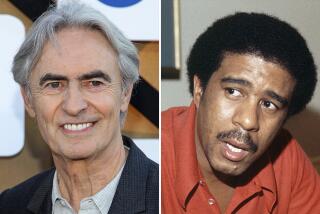Is Blame Misplaced for Copycat Crime?
- Share via
In response to Carole Lieberman (“The Role of Hollywood in Copycat Crime,” Calendar, Sept. 2), I think it should be clear to all that she is suggesting nothing more or less than censorship. I don’t care how she phrases it, how she tells us it will help those of us in the creative community “take responsibility” for those who perform acts of violence that appear to duplicate what they see on the screen.
Lieberman fails to mention any hint of predisposition on the parts of these criminals, many of whom are already bent on committing crimes. Movies and television do not create violence; they only mirror such acts.
As for myself, I would rather live in a world that allows “Natural Born Killers,” than one that tells me what to see and think.
JOEL DAVIS
Los Angeles
*
Using shameless, emotion-baiting language (e.g.: “In a voice weakened by gunshot wounds. . . .) in her frontal assault on the Constitution, Carole Lieberman shows herself to be one of two things: a well-meaning but deeply misguided citizen, or a foot soldier at the vanguard of the war on free-thought. I’m not sure which is most frightening.
Are artists responsible for the deeds of people who use their works as inspiration for violent acts? Lieberman and those in her camp say yes, that Oliver Stone, the Beatles and even Goethe have inspired antisocial behavior and should therefore be suppressed. But the concept of free speech as used in the Constitution is more than just a catch phrase. It’s an astoundingly optimistic notion: Defend all speech, especially the worst, so that the best may thrive. For example, few of their supporters really wanted the Klan to rally in Skokie, Ill., but they knew that their right to do so must be defended. Like the Founding Fathers, they believed that by giving everyone a fair hearing, good and truth, ultimately, will out.
The freedom of artists to hold the mirror up to nature must, in a free society, not only be defended, but cherished, especially when that nature is grim and often ugly. Don’t forget that Germany once chose between bad art and bad politics. Me, I’ll take bad art. Compared to the alternative, it’s a small price to pay.
DAVID BRITTEN PRIOR
Los Angeles
*
I am neither a psychiatrist nor a statistician, so I cannot say yea or nay on how much influence movies and music have on aspiring criminals. I can, however, express surprise that Lieberman still thinks that the lyrics to “Helter Skelter” portend violence.
Charles Manson was quite adept at twisting anything--from the Bible to the Beatles--to fit his vision of the future. But he completely blew his interpretation of “Helter Skelter,” which was on the surface a description of an amusement park ride.
The Fab Four themselves were pretty good at hidden meanings and subliminal wisecracking, but I doubt that anything in “Helter Skelter” predicted anything as serious as the Armageddon.
EARL EAGER ALBERT
Temple City
More to Read
Only good movies
Get the Indie Focus newsletter, Mark Olsen's weekly guide to the world of cinema.
You may occasionally receive promotional content from the Los Angeles Times.










